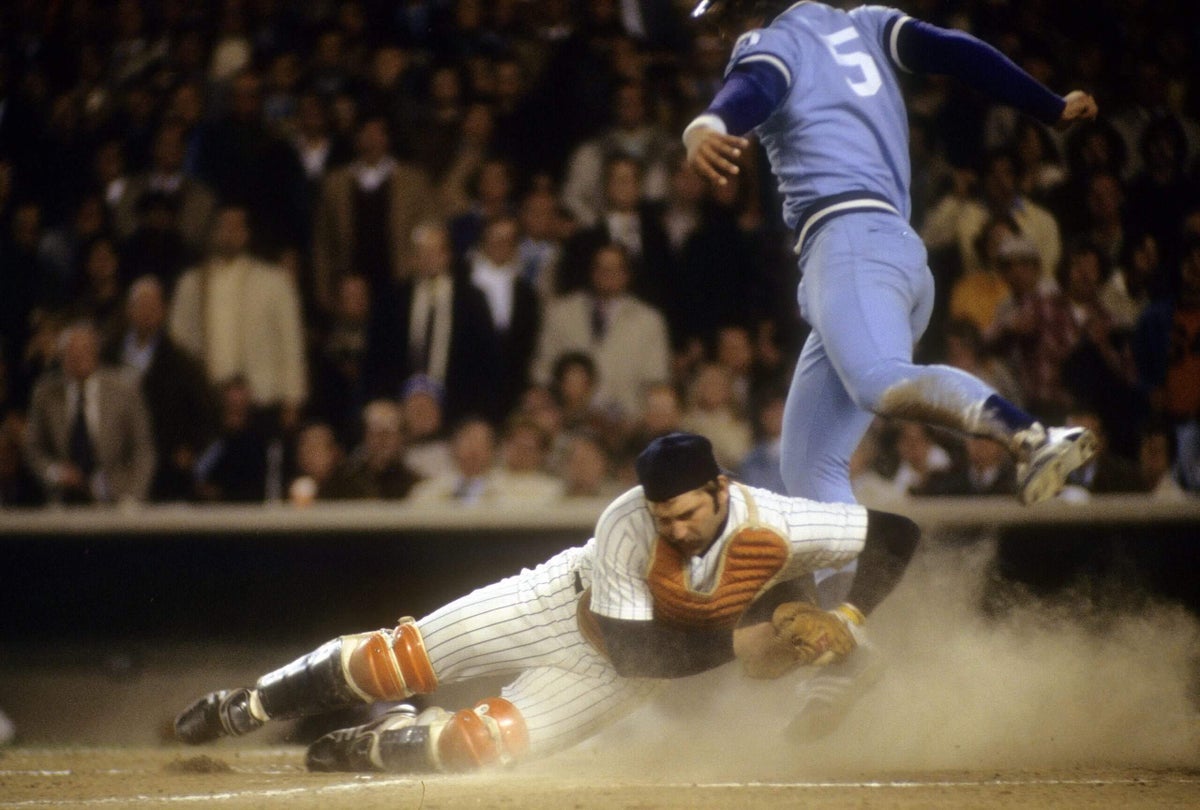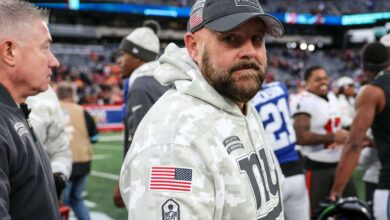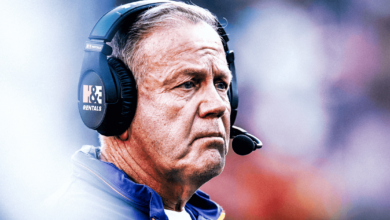‘We hated each other’: When the Yankees and Royals turned baseball into a blood feud

NEW YORK – The moment that defined a rivalry was 47 years ago Sunday. It was a cool fall evening in the Bronx, Game 2 of the 1977 ALCS, and Hal McRae was on first base. The Kansas City Royals trailed the New York Yankees 2-1 in the sixth inning, but McRae had an idea, so he shouted to teammate Freddie Patek, who was on second.
“I gestured to Freddie,” McRae, now 79, said Friday from his home in Florida. “If we got a ground ball, I would take out the middle infielder.”
Sure enough, the Royals’ George Brett grounded out to Yankees third baseman Graig Nettles, who shot to second baseman Willie Randolph, and then it happened, when – BOOM! McRae didn’t so much knock out Randolph as destroy him — a rolling body block that started with McRae catapulting himself headfirst into Randolph’s thighs and both players landing in a heap at least 10 feet from second base. The collision caused Randolph to drop the ball, allowing Patek to run home, causing Yankees manager Billy Martin to fly out of the dugout in anger and Randolph to shout something at McRae.
“As I walked off the field,” McRae said, “he threw the ball at me.”
Watching the clip now takes you to another dimension of baseball, a dimension before terms like big market and small market, before players fraternized as country club friends, when rivalries could be measured in hate, blows and public criticism. More than forty years ago, the Yankees and Royals faced each other four times in the ALCS in five years. On one side were the Yankees of the Bronx Zoo era – Billy Martin, Thurman Munson and later Reggie Jackson – the game’s glamor franchise. On the other side was an expansion team from flyover country with a Hall of Famer at third base and speed to burn. The result was not a baseball series; it was closer to a blood sport.
“It’s a war,” Brett, the Royals Hall of Fame third baseman, said Friday, standing near the third base dugout at Yankee Stadium. “That’s how it was then.”
The old rivalry is over, but the postseason series resumes Saturday night when the Yankees host the Royals in Game 1 of the ALDS, the first postseason series between the clubs since 1980. Gone are Brett and Martin; enter Aaron Judge and Bobby Witt. jr.
For many of the old Royals, history suggests a mix of emotional scar tissue – from three ALCS losses in 1976 to 1978 – and redemption after a breakthrough in 1980. But after more than forty years, it has also forged a common bond. : They were the team that gave the Yankees their best chance. They had a baseball fight in the Bronx and lived to tell the story.
“We hated each other,” said former catcher Buck Martinez. “That’s it.”
“They were the empire,” said former catcher Jamie Quirk, “and we were the new kids.”
“It was just classic stuff that you’ll never forget,” former outfielder Clint Hurdle said. “It was almost like we could be playing a game in the wild, wild west.”

Hal McRae, pictured here after stealing second place in 1978, was a catalyst in the rivalry between the Yankees and Royals. (Focus on Sports / Getty Images)
In the moments before Game 1 of the 1976 ALCS, Brett sat next to Martinez in the home clubhouse in Kansas City. They were roommates in the minor leagues and teammates on the Royals, but this was their first playoff game.
“We were both sitting there really nervous,” Martinez said. “And I asked him, ‘Are you nervous?’ He says, ‘Yes.’ I said, ‘Me too.’ ”
A few minutes later, Brett made two errors in the first innings. Martinez, behind the plate, shouted to third, “You’re okay now.”
The Royals, in their eighth season as a franchise, finally found themselves in the postseason after toppling the Oakland A’s in the AL West. The Yankees, meanwhile, had broken a drought and reached the postseason for the first time since 1964. Compared to the series that would follow, the 1976 ALCS was a relatively tame affair, best known for its dramatic Game 5 in the Bronx.
With the score tied 6-6 with two outs in the top of the ninth, the Royals put runners on first and second base before Jim Wohlford hit a slow bouncer to third and Royals outfielder Al Cowens was forced out at second after a controversial call. For reasons that still baffle Martinez, the third out of the inning left Yankees fans littering the field with toilet paper streamers and trash. While Royals pitcher Mark Littell took to the mound to warm up in the ninth, the game was postponed as the grounds crew attempted to clear the field.
“We were on the field, it seemed like forever,” Martinez said.
Brett is still not sure if the delay affected Littell, but he does know what happened moments later: Littell threw a fastball to New York’s Chris Chambliss, who took a violent cut and blasted a game-winning home run to right-center field. As the ball crossed the fence, hundreds of New York fans poured onto the field. Brett made a beeline for the third base dugout. Martinez sprinted in from home plate. But McRae, in right field, had no clear path to the dugout, so he sprinted across the outfield, where he found shelter in an open fence in left field.
“The door was open, so I ran to that area,” McRae said. “It was a scary feeling. Because the fans were pouring onto the field and I didn’t know what was going to happen.”
Yes, this was the tame series.
The following year, in the fall of 1977, the Royals and Yankees would meet again in another five-game classic, one filled with clashes, brawls and pages and pages of verbal fistfights. At one point during the series, Martin, the Yankees’ fiery manager, made a point of telling writers that he was excited to face pitcher Larry Gura, a former Yankee, in Game 4.
“My only concern I have is that he doesn’t get hurt on the way to the ballpark,” Martin told reporters again and again. “I mean, in an accident or something. Maybe I should send a bodyguard to his house.’
And that was nothing compared to what happened before Game 4, when the Yankees’ Cliff Johnson, still furious about Randolph being destroyed, spent most of batting practice yelling at the Royals’ McRae.
McRae, a 32-year-old in his ninth season, was unfazed. He had grown up in Cincinnati, where he had learned to emulate teammate Pete Rose’s playing style. He sprinted on every ground ball. He held teammates accountable. Whenever teammate Dennis Leonard made a start, McRae would raise a few fingers as Leonard walked to the bullpen to warm up. That was the number of points the Royals would score that day.
However, the crossbody block was his own invention.
“Because I knew I could make contact and he wouldn’t be able to throw to first base,” McRae said.
Suffice to say, McRae wasn’t the kind of guy who had time for Johnson, a backup player.
“I told Cliff,” McRae said. “I’m not going to get into a fight with an ‘extra man’.”
Nevertheless, the Yankees won Game 4 in Kansas City, setting up a winner-take-all Game 5 made famous for the first-inning brawl between Brett and Graig Nettles. Brett hit an RBI triple and drove in hard to third base. Nettles kicked him. More than a little alarmed, Brett threw an overhand haymaker, setting off a wild skirmish in which Yankees catcher Thurman Munson covered Brett at the bottom of the pile — “He was just kind of protecting George on the ground,” Martinez said — and started pitcher Ron Guidry jumping in the battle.

Graig Nettles and George Brett brawl at third base (Getty Photos)
“I remember George coming back to the dugout and saying, ‘He kicked me,’” Quirk said.
No one was thrown out.
“The referees dusted everyone off,” Martinez said. “And then they said: Are you ready now? Okay, let’s go. ”
This time the Royals took a 3-2 lead in the ninth. But the Yankees struck for three runs to win a second straight AL pennant en route to their first World Series championship since 1962.
“That was probably the most heartbreaking for us,” starting pitcher Dennis Leonard said. “Because honestly, I felt like we had the best team in baseball. But they won. What are you going to say?”
The Yankees would win again in 1978. It didn’t matter that Brett hit three home runs off Catfish Hunter in Game 3; the Yankees won the game 6-5 and took the series in four. The Royals and Yankees would both miss the playoffs in 1979, but they met for the fourth time in 1980. This time the Royals had a closer: Dan Quisenberry. Brett homered off Goose Gossage in Game 3. They won the series in three games.
The 1980 Royals would lose the World Series to the Phillies in six games, and it would be another five years before they finally won their first World Series. But for many players, eventually beating the Yankees was almost as good as winning it all.
“I was playing right field when Dan Quisenberry struck out Willie Randolph for the final out,” said former Royal John Wathan. “That’s the first and only time I’ve ever cried in baseball.”
One summer day in the 1990s a funny thing happened. Wathan attended a charity golf tournament with a collection of old Royals and Yankees from the late 1970s, two groups that had hated each other for the fourth of October.
“You kind of realize they’re pretty good guys,” Wathan said, laughing.
Friendships have blossomed. War stories have been traded. Hurdle lives near Bucky Dent in Florida and still marvels at the competitiveness of Lou Piniella and Munson, who died 10 months after the 1978 series.
“Because they just wanted to beat you up,” Hurdle said. “And when you look at those two, what better guys to have on your team than guys who just want to beat the other team’s ass.”
Nearly half a century later, Brett has made a similar peace. He doesn’t hate those players anymore. But he still hates the Yankees. He can’t help it.
McRae goes one step further.
“I don’t think we hated the guys,” McRae says. “We hated the Yankees. Because they had all the advantages, we thought. They had the resources to sign players. We were jealous that they could do things we couldn’t. And I think that was the essence of it.”
On the eve of another playoff battle between Kansas City and New York, McRae told another old story, one not as famous as the Randolph elimination or the Brett-Nettles feud. When the final out was recorded in 1977, after the talking and brawling was over, a few Royals walked to the Yankees clubhouse.
“We went there and we sat there and congratulated them,” he said. “It was over. The war was over.”
(Top photo of Yankee catcher Thurman Munson trying to prevent George Brett from scoring: Focus on Sport / Getty Images)




